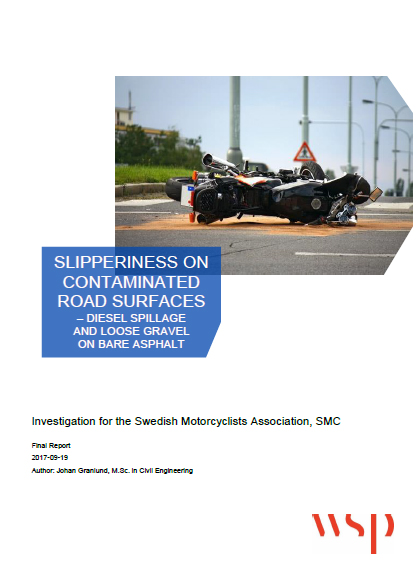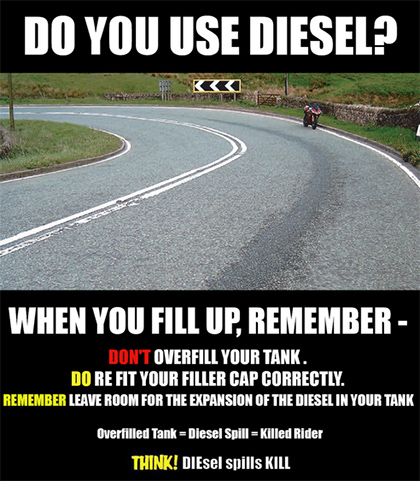 Sweden – SMC the Swedish Motorcyclists Association (Sveriges MotorCykliste) has reported on the issue of diesel spills from vehicles on Swedish roads where they ordered a test were friction on gravel and diesel was measured with alarming test results.
Sweden – SMC the Swedish Motorcyclists Association (Sveriges MotorCykliste) has reported on the issue of diesel spills from vehicles on Swedish roads where they ordered a test were friction on gravel and diesel was measured with alarming test results.
Saying what motorcyclists, road engineers and authorities have known for decades, SMC has gone through the issue as it affects Swedish motorcyclists though which could be the issue anywhere in the world.
SMC – Diesel And Oil Spills
Every year a number of motorcycle and moped accidents happen due to diesel spillage from lorries and buses. The most common spillage is diesel fuel, but spillage can also include oil leaks.
What most people do not know is that diesel on dry roads means as low a friction as a road with packed snow. For SMC, it is important to highlight the problem to anyone who can help reduce spills, thereby contributing to increased safety for riders of a motorcycle or a moped.
Every day, huge amounts of diesel are spilled on our roads, either by mistake and by carelessness.
This leads to unexpected spots with a low friction as on a winter road. Most common places for slipperiness caused by diesel are horizontal curves, ramps and roundabouts – which are the places where powered two-wheelers have the highest need for good friction.
In several European countries there are statistics showing that every ten of motorcycle accidents are due to diesel. These statistics are not available in Sweden. However, the role diesel and oil plays in Sweden are well known as well as accidents.
Why are there diesel and oil spills on the roads?
A common cause is the overfilling of fuel tanks. Diesel tanks in heavy vehicles are filled to the brim. The overflow then flows out through the vehicle’s overflow pipe when the vehicle is driving away. It is very common to see traces of diesel from bus garages, from fuel stations by heavy vehicles and on roundabouts close to fuel stations.
Manufacturers should make it impossible to overfill the tank. Drivers should also be informed of the increased accident risk for motorcycles and mopeds that the overfilling of tanks can lead to, they should be encouraged never to overfill.
A solution to the problem of overfilling is Tanksafe
Another reason that diesel overflows is that the driver does not close the fuel cap. Here the manufacturer should be asked that the vehicle cannot be started unless the cover is closed. With today’s technology, this should not be a problem!
In 2002 FEMA (Federation of European Motorcyclists Associations) submitted to the Global Harmonisation of Vehicle Technical Regulations a document outlining the – “Considerations from the User regarding Regulation 34 Diesel spillage” – before perhaps the advent of technological achievements, “… to change regulations requiring vehicles to have a chain fixing the tank cap to the filler pipe adds to road safety, since it significantly diminishes the possibilities of forgetting to properly close the tank cap. Furthermore, in the event of the tank cap not being fixed correctly, a driver of these vehicles can be alerted by hearing it knocking against the bodywork of the vehicle. It therefore contributes to limiting the dangers related to diesel spillage for motorcyclists and other road users.”
At the Tylösand Seminar, Police in Gothenburg reported deficiencies detected during spot inspections of buses, that of 149 investigated buses in 2011 there was 80 oil leaks and 15 fuel leaks were detected.
What is the level of friction of diesel fuel?
SMC did not find any basis, in Sweden, Europe or the world, showing how friction changes in the case of diesel engines. Therefore, SMC commissioned a friction test by the WSP Group – Slipperiness On Contaminated Road Surfaces–Diesel Spillage And Loose Gravel On Bare Asphalt – the measurements in the test show that the friction deteriorated dramatically.
The conclusion of the study stated, “Heavy vehicles with full tanks are the main sources of diesel spillage. Motorcycle-crashes on contaminated road surfaces have a pronounced concentration at horizontal curves, ramps and roundabouts. The Vision Zero pays special attention to vulnerable road users, a group that in fact include motorbikers. There is a wide consensus on that loose gravel as well as diesel spillage on bare asphalt makes the road slippery and thus unsafe.”
Adding further in the conclusion, “The objective of this study was to investigate what road friction numbers can occur, when asphalt pavements are contaminated by loose gravel or by diesel fuel spillage.
Road friction numbers were measured on a test section with dry asphalt (reference condition), then with contamination of winter grit 2 – 6 mm fine gravel, and finally with contamination of 10 litre diesel fuel.
The results showed that the dry bare asphalt had friction numbers of 0.70 to 0.80, but after contamination the friction was reduced to less than half. Loose gravel reduced friction down to 0.35, while diesel fuel spillage reduced friction down to 0.30.
The conclusion is that in contaminated conditions, the dry asphalt may become about as slippery as hard packed snow in the winter season.
Motorbikers riding in a warm summer day on dry asphalt should not expect the road to be as slippery as when riding on snow during the cold winter season. Therefore, it is important that management of contaminations is made with high alertness. Warning signs must be quickly erected, and as soon as possible loose gravel as well as diesel must be cleaned up.
The recommendations are that road agencies should seek to improve practices for road repair in order to better prevent excessive loose gravel on the asphalt.
Furthermore, unbound material is to be replaced by stabilized material at the asphalt edge. Road agencies should also improve friction management so it becomes more relevant for PTW safety, i.e. reducing averaging distance for friction numbers from 20 m down to 5 m (or in the future: even shorter) while also raising the limit value for minimum friction specifically in horizontal curves.
Heavy vehicle operators should seek to implement technologies and practices to prevent diesel spillage from their vehicles.”
United Kingdom
 As we suggested at the start that the issue of diesel spills and road contamination could be reported anywhere in the world.
As we suggested at the start that the issue of diesel spills and road contamination could be reported anywhere in the world.
Seeking a solution to diesel spills in the UK came from dedication of “KillSpills” a voluntary group of motorcyclists founded in 2003, first supported by the Motorcycle Action Group (MAG) and then with funding and further support via the British Motorcyclists Federation (BMF).
This group campaigned relentlessly through demos, events, lobbying, petitions, surveys, public awareness and education for other road users and reports to government until its final report to the government in 2007- KillSpills fourth Annual report to the Prime Minister – Every time you overfill someone else pays for it – 2007 – which laid out a “KillSpills” 7 point action plan identifying to help increase awareness and to educate both diesel and road users as to the dangers diesel spills.
Eventually leading in 2010 to the TRL study the “Review of Diesel Spillage Clean – Up Procedures” – 2010
The Motorcycle Action Group still highlights the issue with the production of their Diesel Spills Kill – Don’t Overfill – sticker designed for placing on petrol station pumps, vehicle tanks and above filler caps – further information www.mag-uk.org
In Ireland the issue diesel spills issue was highlighted in 2011 through MAG Ireland – another rider organisation that like the previous mentioned organisation are members of FEMA (Federation of European Motorcyclists Associations).
Mayo County Council initiated a “Cap It” initiative to help prevent diesel spills on the roads stating that, “The problem is mainly caused by drivers forgetting to put the fuel cap back on properly, as well as the overfilling of fuel tanks on vehicles.” – “Diesel/oil spillages are hazards which threaten the safety of all road users. Vehicles can skid, swerve and lose control on patches of diesel, endangering their drivers, passengers, other road users, pedestrians and property. Wet weather can worsen slicks and, coupled with bad light, can sometimes make them impossible to see. Diesel can take up to 100 days to break down so can remain on the road surface for a long time, often reappearing only during rain”.
Interesting to note that the SMC study states as regards diesel and wetness: “The project team had an idea that diesel spillage may become even more slippery, if it rains on it. Therefore, the testing ended with a set up where the diesel spillage was gently watered from a water hose. After allowing the diesel to become diluted by the moisture for fifteen minutes, two finishing measurement runs were done; one in each direction. The results are showed in Figure 12. Within the test section, friction numbers were in the range 0.32 to 0.43. These results are within the variance of the above results for slipperiness on non-watered diesel spillage. These results therefore do not support the hypothesis that water can significantly increase the slipperiness on diesel spillage.”
As Right To Ride in Northern Ireland we conducted an awareness campaign on Diesel Spills with a sticker (20,000) and poster campaign which was sponsored by the then Adelaide Motorbike Insurance (now Cornmarket Motorbike Insurance), we also highlighted the issue through our “Fix A Road” campaign. The advice was that although highways agencies and local councils have online and telephone reporting systems for defective roads. In the case of diesel spills or other contaminants on the road, which are a significant danger for motorcyclists especially diesel spillages, our advice was to report these directly to the police.
Conclusion
Since then there appears to have been no great dedicated effort on highlighting diesels spills or in their reduction. Thankfully SMC with their report has brought the issue back into the frame which can be used outside of Sweden. Or simply, the issue has not gone away.
Original Source – SMC – Diesel – och oljespill (vis Google Translate) – view the full report – Slipperiness On Contaminated Road Surfaces–Diesel Spillage And Loose Gravel On Bare Asphalt – and other reports on diesel spills.


Bra informationsfilm som borde visas för både MC förare och Bilister och yrkesförare.
Speciellt dom med nytaget körkort och inte så mycket erfarenhet kanske inte tänker på att detta plötsligt kan dyka upp. 🙂